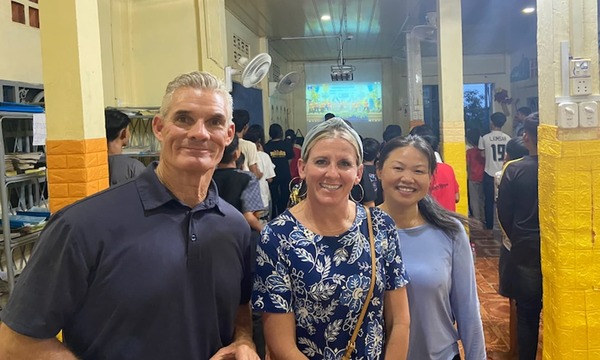A recent edition of Time magazine featured an article titled, “How Science Can Lead the Way: What we lose when we put faith over logic.” The article holds to the underlying assumption that Christianity cannot be supported with reasonable evidence, a statement Craig Hazen, professor of comparative religion and apologetics, vehemently opposes.
Hazen, an expert in science and religion who has debated this topic on Capitol Hill and in the White House, hosted a seminar on Oct. 11 discussing the presence of doubt in the church and counteracting several misconceptions about Christianity. Biola students flocked to the seminar, filling the hall and leaving only standing room, showing an obvious interest in the subject.
“Doubt is not the opposite of faith. It is a spiritual uncertainty,” said Hazen.
Hazen encouraged his audience, suggesting skepticism is a natural part of a faithful believer’s journey toward a more secure conviction about Christianity. According to Hazen, God can handle the challenging questions as they draw the skeptic closer toward a more personal relationship with God.
Many intellectuals have taken issue with the claim that religion resides outside the bounds of empiricism and rationalism. They contend that Christian truths can be supported with historical evidence, logical rationale and even scientific proof. The assertion faces opposition from all parts of the globe, especially from atheists who frequently deny the existence of a sound defense for Christian beliefs.
Hazen told students that William Lane Craig, a fellow Biola professor and one of the world’s leading philosophers of religion, is on tour in the U.K. debating Christian apologetics from Oct. 17 to 26. Craig extended four invitations to Richard Dawkins, former professor of science at the University of Oxford and author of The God Delusion, all of which the prominent atheist debater declined. Fellow atheists accused Dawkins of cowardice for refusing the invitations in an article in The Telegraph. Hazen indicated this refusal shows a clear lack of confidence in the naturalist defense.
The obvious interest in apologetics, doubts and questions of faith from students is met by the ongoing Apologia Ministry, who put together and promoted the well-attended event. The group meets on campus weekly to cover related topics and holds an open forum for students to participate in discussions.
Student leader Leonardo Calderon described the two-fold purpose of the undergraduate ministry: to help people struggling with doubt to overcome obstacles in their faith, and to encourage and equip students to effectively defend their beliefs.
“It’s a place where you can really come forward with any questions or doubts you have,” explained Calderon. “We try to get to students at that phase in their faith when they’ve been asked difficult questions.”
The Apologia Ministry, which derives its name from the Greek word meaning “to defend,” continues to provide students with logical, defensible answers.
Written by Jessica Airey, Media Relations Intern. For more information, please contact Jenna Bartlo, Media Relations Coordinator, at jenna.l.bartlo@biola.edu or via phone at 562.777.4061.
 Biola University
Biola University
_(1).jpeg)
.jpg)